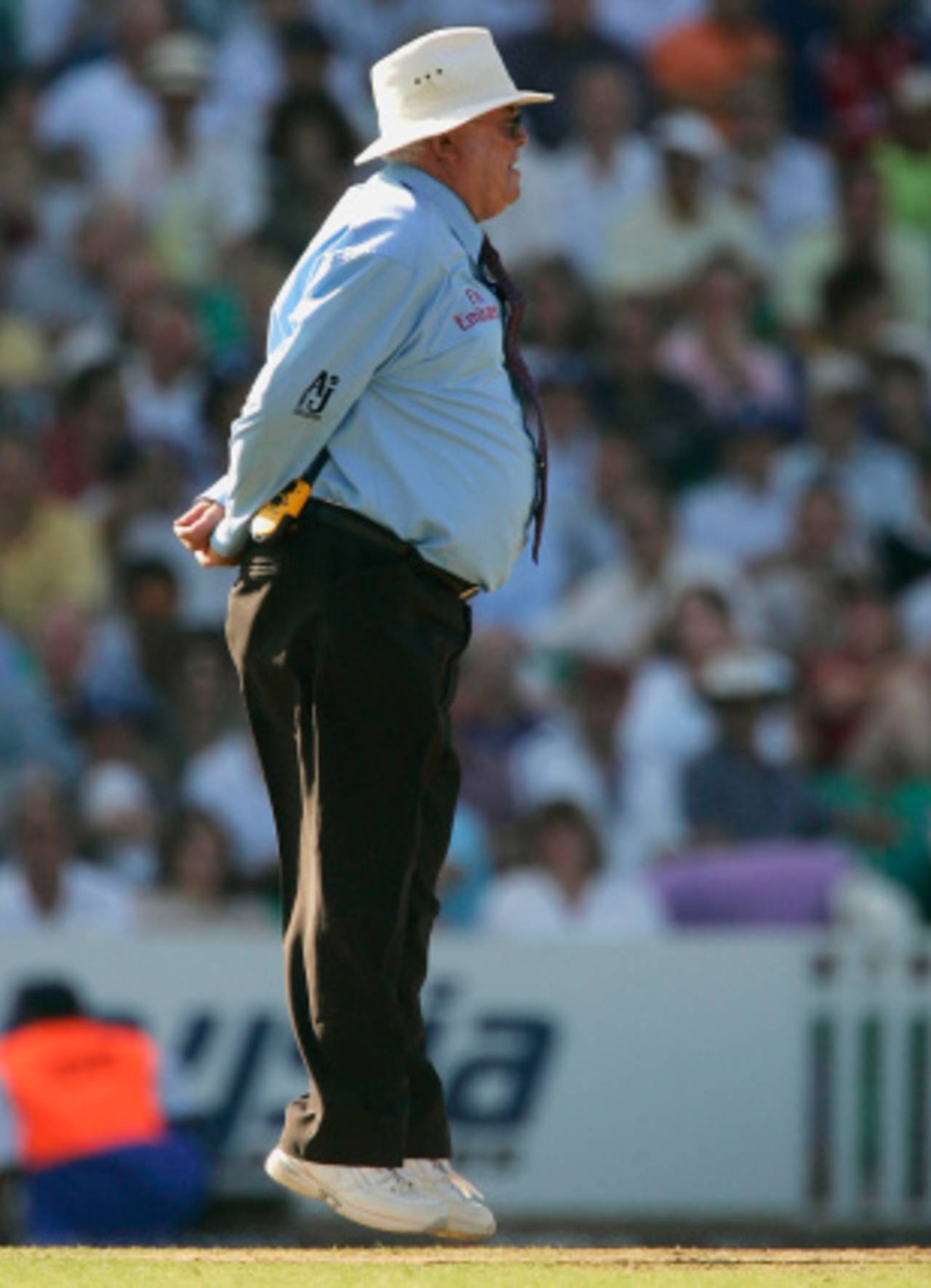The mystery of the missing batsman
Also: lowest total in an innings win, most first-class runs in a season, whitewashing Australia, and the first umpire to stand in all ten countries

David Shepherd: the first umpire to officiate in all ten Test-playing nations • Getty Images
This one proved very troublesome - but eventually I found the answer while I was looking for something else! In the 1985 update of Next Man In, Gerald Brodribb's entertaining study of the development of cricket's Laws, he writes; "Essex began to collapse with such rapidity that at one moment it was discovered that a ball had been bowled before the arrival of the incoming batsman. This particular ball was hit for six by Nichols, and then it was seen that his partner had not yet arrived. After a brief delay for the gap to be filled, Nichols was promptly out next ball!" So Nichols' six apparently came when there was no non-striker in position. I have to say I haven't been able to find any other evidence of this occurrence: Wisden and the Cricketer don't mention it, while the Times' match report the following day says that Nichols was out immediately after Charles Bray changed his bat. It's possible, I suppose, that the ball was bowled while Bray was off changing his bat - but Brodribb, an assiduous researcher, must have had some source for his story, even if it's not immediately apparent now.
West Indies almost won that match in Bridgetown last month by an innings - in the end they had to go in again and score 12 runs, and eventually won by nine wickets. Even if 307 had been enough to win, there have actually been 19 smaller totals in Tests that led to innings victories. The lowest of all is Australia's 153 on a treacherous pitch in Melbourne in 1931-32 - South Africa were bowled out for 36 and 45, with slow left-armer Bert Ironmonger, two months short of his 50th birthday, taking 5 for 6 and 6 for 18. At Old Trafford in 1888, England's 172 proved enough to beat Australia (81 and 70), while in Wellington in 1945-46, Australia bowled New Zealand out for 42 and 54 to win by an innings and 103 runs despite scoring only 199 for 8 themselves. The smallest first-innings advantage to translate into an innings victory was England's lead of 46 in Auckland in 1954-55: they managed only 246 in reply to New Zealand's 200, but then demolished them for 26, still the lowest Test total of all.
Cheteshwar Pujara fell just short of the record for a season in India, which remains Chandu Borde's 1604 runs in 1964-65. Borde, though, had 28 innings (average 64.16) to Pujara's 23 (93.23). The record for any season outside England (where the record remains Denis Compton's 3816 runs at 90.85 in 1947) was set by New Zealand's John Reid, on tour in South Africa in 1961-62, when he piled up 1915 runs at an average of 68.39.
Australia's 4-0 defeat in India was only the second time they had lost all the Tests in a series of more than three matches, the other occasion having come in South Africa in 1969-70. Australia have lost all the matches in a three-Test series only twice - in England in 1886, and in Pakistan in 1982-83. They're more used to dishing it out, having whitewashed other teams no fewer than 20 times in series of three matches or more, including the Ashes series of 1920-21 and 2006-07. For a full list of Test series clean sweeps, click here.
Peter Siddle's double for Australia against India in Delhi, where he scored 51 in the first innings and 50 in the second, is the first occasion that any No. 9 has made two half-centuries in the same Test (only four No. 8s have ever done it either). The closest approach was by Stuart Broad, who scored 64 and 44 against India at Trent Bridge in 2011. Siddle is also the first No. 9 to top-score in both his side's innings in a Test.
Only seven men have managed this feat, which has only really been possible since the establishment of the ICC's umpires' panel and Bangladesh's arrival as a Test-playing nation. Having said that, the first man to complete the full set did so before Bangladesh's elevation: David Shepherd stood in the final of the Asian Test Championship in Dhaka in March 1999, having already officiated in Tests in the other nine countries. He has since been joined by Steve Bucknor (who completed his set in Bangladesh's inaugural Test in 2000-01), Russell Tiffin (2001-02), Dave Orchard (2002-03), Billy Bowden and Daryl Harper (both 2004-05), and Asoka de Silva (2008-09). Bucknor, Harper, Bowden and de Silva have also stood in Tests in the UAE. Rudi Koertzen, the only man other than Bucknor to stand in more than 100 Tests, never did one in Bangladesh. It will be difficult, if not quite impossible, for anyone else to join this list, as all Tests these days are supposed to have third-country officials (so an umpire is unlikely to stand in a home Test). The most Tests by one umpire in a single country is 54, by Dickie Bird in England (he also stood in 12 overseas).
Steven Lynch is the editor of the Wisden Guide to International Cricket 2013